While the Olympic athletes of the world held their collective breath to see if they’d be allowed to compete in Tokyo this year, Northeast paddlers similarly awaited news of the Blackburn Challenge. Of course, there was one critical difference: In our case, half the field was praying for deliverance from the three-hour sufferfest. The City of Gloucester was understandably hesitant to permit a large race on her shores, especially given the degree of virus uncertainty at the time of initial planning. The Cape Ann Rowing Club, on the other hand, was eager to resuscitate a 30-some year tradition of grim torment. Through a series of extended negotiations – I’m imagining something on par with that of a nuclear arms reduction treaty, both in terms of scope and significance – Gloucester and CARC reached an agreement. The compromise involved a raft of new restrictions: fewer participants, no first-time racers, no official timing, no after-party, no rafts, etc. And then, in a last-minute twist, the race was rescheduled from mid July to early August. Despite all of this, the call of the Blackburn proved irresistible.
The 19.5 mile course is easy to describe. You paddle out the Annisquam River (actually a tidal estuary), then follow the coast of Cape Ann all the way around into Gloucester Harbor, finishing at the wooden structure known as the Greasy Pole. You’ll pass 5 lighthouses and innumerable miles (don’t let the 19.5 fool you) of scenic shoreline, but you’ll probably be in a head-down semi-conscious state of exhaustion for most of that trip, so try to pay particular attention to the first half-hour. One of the fascinating features of the Blackburn is how the conditions vary as you progress around Cape Ann. You get a little bit of everything: against the tide; against the wind and tide; against the homicidal boaters and wind and tide. On this day, we’d be defending ourselves against a particularly virulent strain of tide. On the positive side, the southeast wind would only be in the 7-10 knot range and the Boater Danger Rating wasn’t expected to exceed Orange (“Seek immediate cover”).
The late change of date and the added restrictions gave the field more of a local feel than usual. It was a farm-to-table kind of event, stocked primarily with home-grown New England talent, but peppered with a few zesty competitors shipped in fresh from NJ and NY. Chief among these, of course, was Rob Jehn. Within a very short span, Rob has established himself as the alpha open-water paddler of the Northeast. Sure, he might in turn bow to an international-caliber athlete like Sean Brennan, but you can’t criticize the leader of the wolf pack just because he succumbs to a grizzly. It’s apples and demi-gods. Other imports included John Costello and John Hair, who had both driven me hard at the Toms River Race a couple of weeks ago. However, I figured my fiercest competition would come from a paddler born-and-bred not 5 miles from the starting line – Matt Drayer. Beating Rob would be an “out-and-out fluke”. Beating Matt would fall somewhere between “in a blue moon” and “when pigs fly”. In the doubles field, out-of-towners Erin and Alan Lamb would face off against locals (and first-time tandem paddlers) Ryan Bardsley and Bernie Romanowski.

Mr. Drayer and I have faced off in our Tuesday night league in Salem Sound a dozen times a season for the past 9 years, so we’re now on a first-name basis. Despite technically being his sensei (The League has some fascinating traditions), Matt’s been breathing down my neck that entire time. Which more and more often has involved a special apparatus of tubes and bellows that redirect his exhalations backwards. Over the last couple of months, however, Matt has evolved to a new level. He’s started calling me “Grasshopper”. Fortunately, that means I’m no longer in his crosshairs. He’s out for bigger prey. If I could be the remora to his shark, maybe I could slip by him unnoticed while he was picking Rob’s splintered boat from his teeth. To the extent that I had a strategy, it was to glue myself on Matt’s stern, hoping that he could in turn keep a firm grip on Rob.
Wesley Echols had coordinated a mass start for the surfski field, after which we’d time ourselves. We arranged ourselves in the customary Blackburn fashion, and Wesley counted us down to the start. Earlier in the week, I had spent a half-hour on a pond in my ICF boat, joyfully pretending that I was in an Olympics 200m K1 sprint. No matter how many times I tried, I was still finishing several seconds behind the slowest heat finisher in Tokyo (a dynamic young lady paddling for Algeria). But perhaps this practice had honed my starting skills, because I leapt off the line smartly and was jockeying for a choice position behind Matt and Rob within the first 30 seconds.
John H apparently had the same goal. He had the line on Matt’s stern, but I was a quarter boat length ahead. If we were walking together on the sidewalk and I suddenly shoved John into traffic, I probably wouldn’t be getting any more Christmas cards from him. What some sticklers might consider manslaughter in everyday life, in racing seems pardonable. Acceptable, even. In fact, let’s go with inevitable. Which is how John found himself on the outside, looking in. Or rather, on the starboard side, looking over. I was now safely ensconced behind Matt. John told me after the race that I was probably his “best friend in the whole world” (he’d had a few IPAs), so all was apparently forgiven.

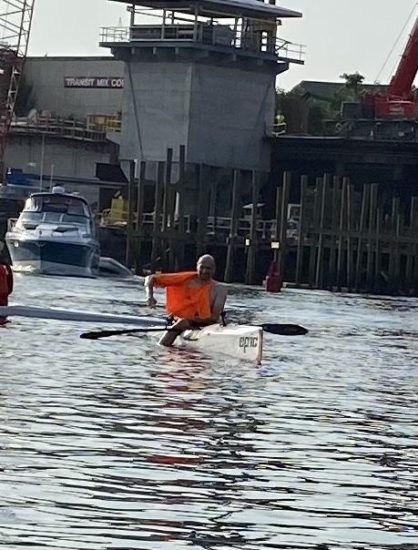
With John H, John C, and the two doubles fanned out behind, Rob led us up the Annisquam against a rapidly increasing tidal current. I had hoped that Matt and I could use our local knowledge of the winding Annisquam to sneak by Rob, but it’s a little tough to be furtive in fluorescent clothing on a narrow waterway. Particularly when the opposing general has enough excess power and stamina that he can afford to stop, turn-around, stand up in his ski, and survey the battlefield. Early on I attempted a few surprise attacks from the flanks, but Rob quickly identified and neutralized the threat. Although Matt was initially smack on Rob’s stern, he soon fell back a couple of lengths before locking in at that position. I remained tight on Matt’s draft. In this configuration, we began to separate from the rest of the field. I had little sense of what was happening behind our lead group (other than being utterly convinced that they would reappear beside me at any moment), but from GoPro footage and first-hand accounts, I gather that the two doubles, John H, and John C formed the primary chase pack, with a secondary pack composed of Tim Dwyer, Tim Hacket, and Nate Day. Rob led the field out of the river and started down the coast towards Halibut Point. Mercifully, once we cleared Annisquam Light, we had a respite from the tide.
About 5 miles into the race, let’s say that my conscience finally got the better of me. I had remained affixed to Matt’s stern for 97% of this time. And drafting his side wake for the other 3%. With only 15 miles to go, it seemed a virtual certainty that I could maintain this position until passing him in a final sprint. Matt had trained too hard to be beaten in such an underhanded way. Don’t put too much credence in those naysayers that claim that “by definition” you can’t actually exceed your maximum heart rate. I had been doing just that for the last 30 seconds – would another 2 hours kill me? So I did the noble thing. Like Jack slipping silently off that door in the North Atlantic, sacrificing himself so that Rose could survive, I slid off of Matt’s stern. There was a little more strangled gasping than you’d like for a nice clean simile, but I think we can agree that the eerie physical similarities between me and a young DiCaprio more than compensate for that deficiency.
Rob was gradually widening his lead on Matt, and now the latter on me. Reaching Halibut Point after about an hour of paddling, I suspected that someone was playing a trick on me. Where were the confused waves that prowled these environs even on the calmest days? The wailing of the damned, dashed on the rocks? The lucrative bounty of salvageable flotsam? Instead of all this, the surface of the ocean became increasingly smooth as I rounded the point and progressed into Sandy Bay. Unaccountably, given the winds from the opposite direction, a continuous series of glassy waves arose – modest in size, but significant enough to gently nudge me towards Straitsmouth Gap. Despite the nurturing sea, I was having trouble finding motivation – the continuing advance of Rob and Matt ahead was sapping my resolve. Until…
In their double, Ryan & Bernie were akin to newborn giraffes. When you first see them, they’re just a pile of uncoordinated knees and necks, covered in foul-smelling goo. But mere moments later, in defiance of all logic, they’re wobbling to an upright posture. And then almost immediately they’re taking their first tentative strokes. There’s a brief period of playful exuberance as they experiment with their newfound balance and agility. And finally, having mastered locomotion and with precocious poise, they sail by me in Sandy Bay with a loping gait. I felt privileged to have witnessed this accelerated life cycle, and also more than a little pissed off that these long-limbed bastards were passing me. Fortunately, I was able to channel that anger into a spirited (but futile) attempt to keep pace with the duo. At least they had put enough air in my sails to whisk me from the mental doldrums.
Reaching the halfway point at Straitsmouth Gap, we started to clear the lee of Cape Ann. Within a span of fifty feet, the formerly glossy surface of the sea was replaced by choppy nubbles. Making our way around the rocky headlands over the next couple of miles, the southwest wind, the tide, and refracted waves colluded to throw paddlers off their rhythm, and in a few instances, their boats. The culmination of the aquatic malevolence occurred while passing between Lands End and Milk Island, where I alarmed myself by pausing to have a gel. Had I not narrowly averted a capsize from this foolhardy move, I’d likely still be untangling myself from a viper’s nest of hydration tubes and bungee cords. As it happened, however, I survived the misjudgment and wobbled through the last of confused waters to reach more predictable (but still unfriendly) conditions.
I continued to track Ryan & Bernie via the former’s fluorescent yellow PFD and Matt via his vibrant orange torso (it’s a genetic thing). They were plying an outer line, presumably trying to escape any coastal currents. Their approach seemed so extreme, however, that I eventually began to wonder if they were trying to reach international waters – perhaps to restock whatever pharmaceutical aids were propelling them. I couldn’t take any cues from Rob’s line, since his more muted ensemble (and huge lead) rendered him invisible. This was just as well, since a post-race analysis of his GPS track revealed that he had been engaging in “evasive maneuvers” to throw off pursuers. He finished without being torpedoed, but logged almost a quarter mile more total distance than direct-line competitors.
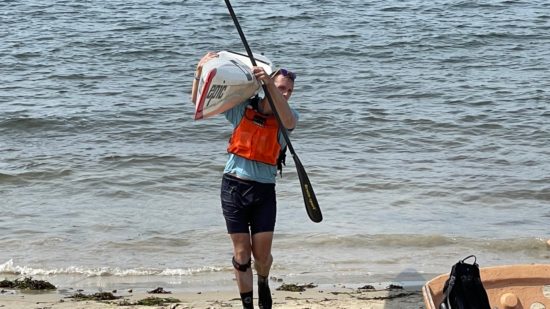
Finding the occasional erratic wave heading diagonally shoreward, I decided to take an inner line that would have me making landfall much earlier than Matt. My hope was that by hugging the coast I could both avoid the tide and perhaps find some rides from refracted waves. The long open water crossing from Milk Island to the Back Shore had some of the earmark elements of a slog – wind and tide against you, choppy conditions, destination never getting closer – but the gods of mischief didn’t seem to have their hearts in it. I watched from afar as Ryan & Bernie passed Matt and receded over the horizon. Amazingly, I seemed to be gaining on the latter as I finally approached landfall. Perhaps he had hit a wall?
Sure enough, I eventually pulled even with Matt. As I chatted with him about the race and the latest developments in the Scottish independence movement (Alba gu bràth!), I came to the gradual realization that my conversation partner was not Matt, but some other person entirely. In fact, this shameless imposter wasn’t even in a surfski! Apparently, my target acquisition software had errantly swapped one distant orange-shirted racer for another during the past half-hour. Should the algorithm have picked up on the fact that the new target was rowing rather than paddling? Probably, but given the general state of oxygen deprivation within the CPU, serious system faults were to be expected. Scanning the zones far ahead, I reacquired Matt (Omega 23, Sector F) and nonchalantly sidled past non-Matt. Mar sin leat, old friend.
I soon had the opportunity to beta test my coast-hugging strategy within a highly realistic environment. I could almost feel the crash of the waves on the rocks and taste the salt spray. I was able to find some decent rides on refracted waves, but I also had to contend with stretches of disorderly churn and make some sudden course corrections to avoid rock-bearing holes that yawned opened in front of me. All in all, I’d characterize the experiment as a wash. When I reached the breakwater protecting the harbor, Matt maintained a half Dog Bar lead. I was tempted to continue close to the quarried rocks, but fear of being snagged by a camouflaged fisherman kept me a cast away.
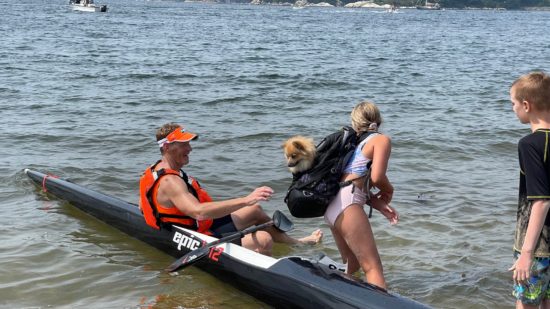
Finally entering Gloucester Harbor, I now had the pleasure of feeling the wind at my back, with attendant waves heading in my general direction – roughly 30 degrees to starboard of the straight line to the finish. The prudent paddler would partake of a few brief rides at a sitting before primly correcting his course, engraving a delicate zig-zag course on the water. Imagine, if you will, you’re a young debutante at an elegant garden party, urged by your genteel hostess to have another macaron. You demur. “Oh no, I couldn’t possibly…” Next thing you know, security is roughly escorting you off the grounds as you struggle to choke down the dozen treats you’ve jammed into your pie-hole. You barely have time to appreciate the fact that the ornamental pond boasts actual live flamingos before you find yourself wildly off-course to the right, in danger of crashing into Ten Pound Island. Fortunately, I don’t think anybody heard my cry of “You can keep your wreteched sweets!” as I sheepishly corrected my line, vowing to never again fall prey to the siren song of wayward waves.
I could make out Matt a quarter mile ahead, paddling towards the finish with something less than fevered zeal. Like me, he appeared to have accepted his lot in life (or at least the race) and was now resigned to grinding through the remainder of the workday. Rob completed the course in 2:50:15, while Matt and I clocked in at 2:55:31 and 2:58:05, respectively. In the ongoing battle to decide who gets to keep the name, John H again clipped John C late in the race. Down 0-3 this season, Costello should probably start fishing around for a new moniker. I’d suggest something unique like Ezekiel or Ha’penny to decrease the chance that he’ll have to refile all that paperwork again in 2022. Tim D similarly moved by Tim H and Nate in the final leg of the race. Hackett is also in a big hole at 1-4, but since “Hack” is a pretty cool nickname, he may just opt to go with that. Mary Beth claimed her second Blackburn crown in the woman’s field, making her that much more difficult to live with. The double of Ryan & Bernie came tantalizing close to catching Rob, finishing slightly over 2 minutes behind for the second fastest overall time of the day. The Lambs took the silver spot for doubles, just missing the 3:00 mark for the fifth best time. Only 4 boats broke that goal, making this one of the slowest Blackburns in the last 20 years – the relentless tidal currents and choppy conditions exacted their toll.
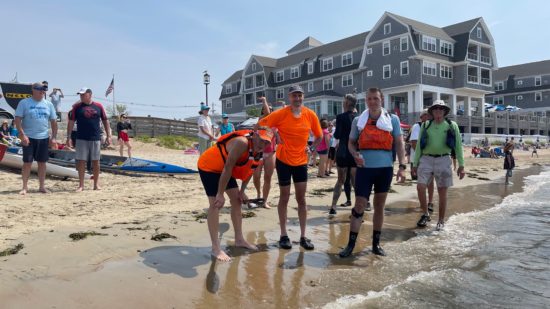
Thanks to the many CARC volunteers, with special gratitude to Chris Chappell, who recorded impressively official unofficial times for the entire field. And congrats to the North Shore locals, who helmed 3 of the fastest 4 boats of the day. Maybe if there’s an asteroid strike or supervolcano eruption between now and the next Blackburn, we can put one of our own on the top step!
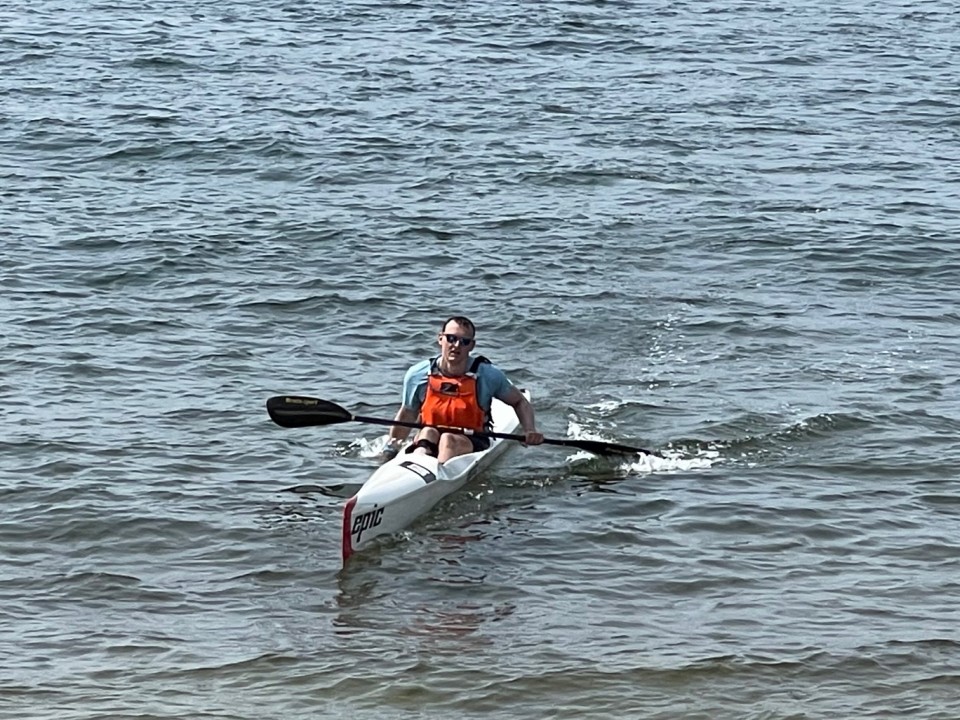
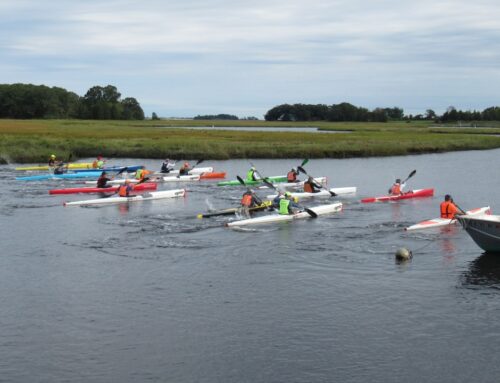
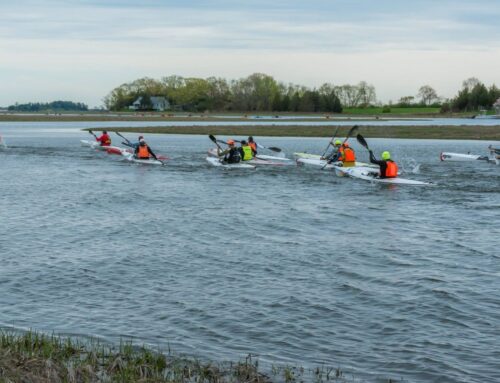
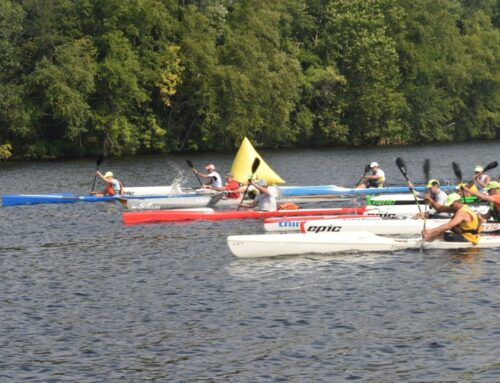
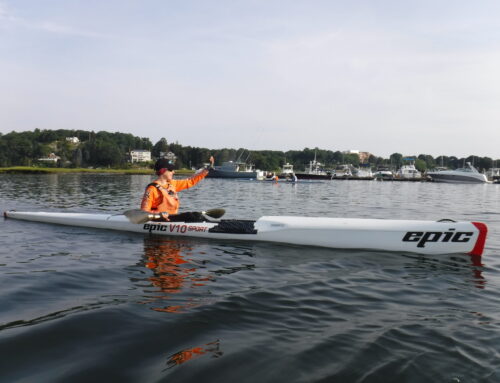
Leave A Comment
You must be logged in to post a comment.